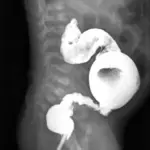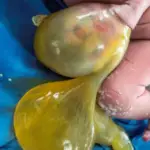Meckel diverticulum is an outpouching or bulge in the lower part of the small intestine. The bulge is congenital present at birth and is a leftover of the umbilical cord.
What is the Pathology of Meckel Diverticulum?
The pathology of meckel diverticulum is:
-Etiology: The cause of meckel diverticulum is the incomplete obliteration of the omphalomesenteric duct in the developing embryo.
-Genes involved: BLOC1S1.
-Pathogenesis: The sequence of events that lead to meckel diverticulum is: In early fetal life, the vitelline or omphalomesenteric duct that connects the midgut to the yolk sac is normally obliterated by the 6th week. If the portion connecting to the ileum fails to atrophy, a Meckel diverticulum results.
-Histology: The histology associated with meckel diverticulum shows Ileitis, heterotopic gastric mucosa, pancreatic tissue, or a combination of both.
How does Meckel Diverticulum Present?
Patients with Meckel diverticulum typically males present at age range of 2-8 years. The symptoms, features, and clinical findings associated with meckel diverticulum include gastrointestinal bleeding, abdominal pain, and cramping.
How is Meckel Diverticulum Diagnosed?
Meckel diverticulum is diagnosed by: Technetium scan, Colonoscopy, Wireless capsule endoscopy.
How is Meckel Diverticulum Treated?
Meckel diverticulum is treated by surgery.
What is the Prognosis of Meckel Diverticulum?
The prognosis of meckel diverticulum is excellent. Patients can expect a full recovery after treatment. In rare cases, excessive bleeding from Meckel’s diverticulum may occur and become life-threatening.



